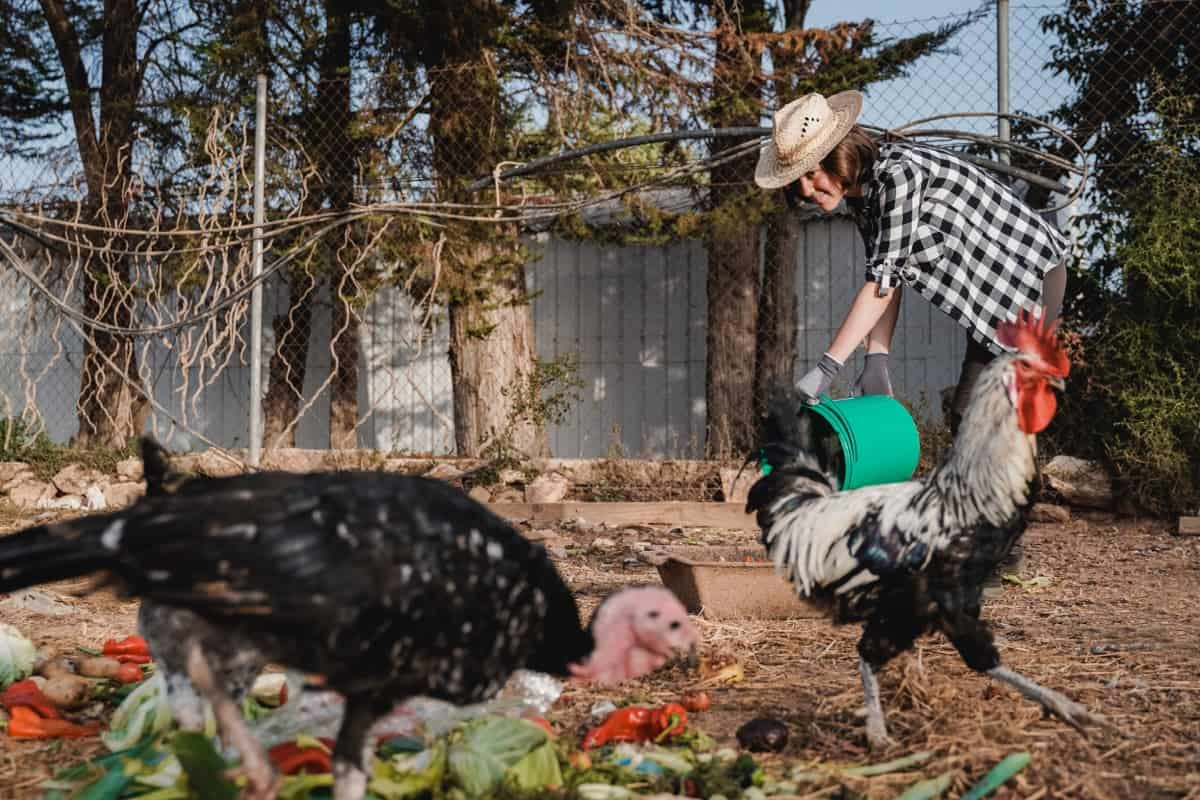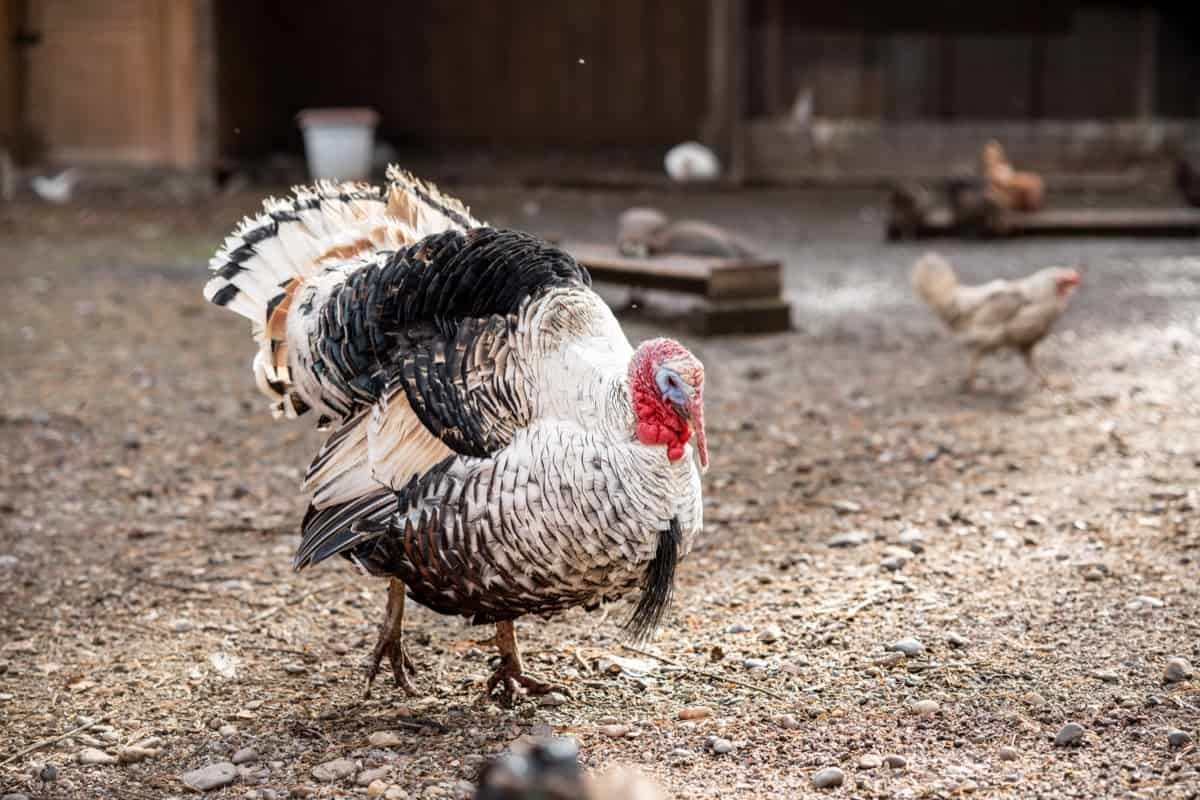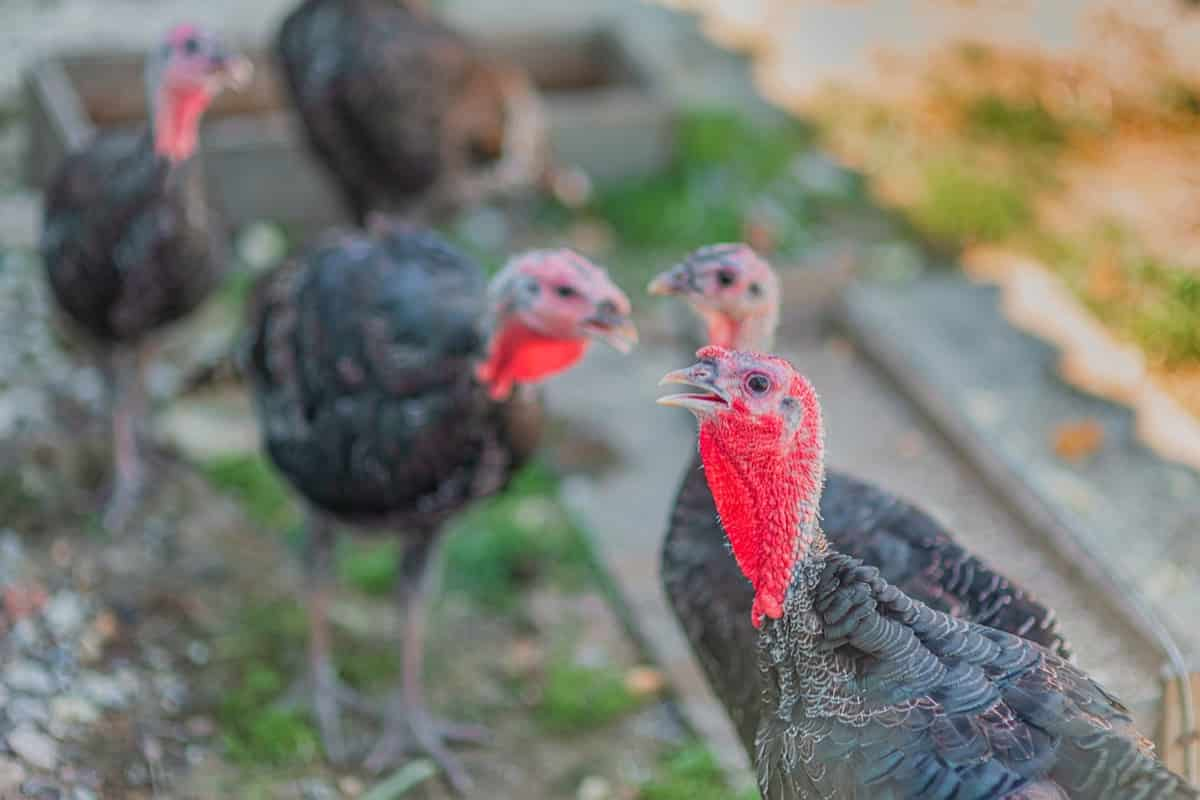If you’re considering raising poultry on a free-range farm, you might wonder whether you can raise turkeys and chickens together. Yes, the answer is yes! In a free-range setting, turkeys and chickens can coexist peacefully and benefit from each other’s company.

Do Chickens and Turkeys Get Along?
Chickens seem to get along best with turkeys, more often than not. Ducks, eh? You can either take them or leave them. Geese, probably not, and they can be dangerous for chickens. They can be as cranky as chickens! However, turkeys tend to get a pass. There is a likely reason for this.
Turkeys are much larger than chickens, and they tend to intimidate them. Furthermore, turkeys are generally more docile than chickens, which helps them get along with them. In domestication, their size and strength advantage, combined with their typical “gentle giant” personality, often results in peaceful cohabitation with the rest of your flock.
Benefits of Raising Turkeys and Chickens Together
In general, turkeys are calmer than chickens. You don’t need to worry about clashing these two bird species. The turkey, especially the turkey hen, typically acts as a peacekeeper in a mixed flock. It has been observed that turkey hens serve as mediators and end fights. You might be able to get the turkeys in order if you have a wayward rooster among them. Understandably, turkeys are generally larger than chickens, and their massive size sends enough of a message.
Additionally, turkeys are more adept at detecting predators than chickens, bringing peace to the flock. The turkeys will make their loud call when they sense danger, and all the other birds will flee. Turkeys can serve as surrogate mothers to young birds if you add them to the coop. In addition, turkeys add a bit of diversity to the coop. In addition to chicken eggs, turkey eggs are available as well.
Chickens and Turkeys Together: Potential Downsides
Chickens and turkeys can be kept together. Nevertheless, you should be cautious of a disease called Histomoniasis. Blackhead disease is another name for histomoniasis. The parasite, which lives in infected worms, can affect both chickens and turkeys.
Blackhead disease: why is it a problem? As a result, chickens are typically carriers once they ingest those worms. Symptoms of the infection can sometimes be seen in them.
A turkey is more prone to contracting the disease, however. They will almost certainly show disease signs, and about 70 to 100% of them will die. There is no treatment for this disease, unfortunately. You may introduce the turkeys to their death without realizing it since chickens may have blackhead disease without showing symptoms. In some regions, blackheads are prevalent. As a result, if your chicken carries the parasite, other birds within that same region can also contract it.
Should You Raise Chickens And Turkeys Together?
Some owners and birds may benefit from this, but it may not work for everyone. You need to consider a few things before keeping chickens and turkeys together. Here are some important factors to consider and ensure are in place before introducing these two poultry types.
The Coop Requirements to Accommodate Both
When housing turkeys with chickens, you should consider that turkeys are significantly larger than chickens. Because of this, they will require more space than chickens on their own. The feet of turkeys are larger than those of chickens, so you’ll need a roosting stick that’s wide enough to accommodate them.
In case you missed it: Top 11 Benefits of Turkey Manure Fertilizer in Agriculture

When the weather is good, turkeys prefer to roost outside rather than in their coops. It may seem ideal logistically, but they must stay in the coop when the weather is bad. Thus, when choosing or constructing a coop for your chickens, you should consider their size and needs.
The Brooder
Brooder temperatures should be the same for turkeys and chickens. While chickens hatch more enthusiastically and aggressively than turkeys, they tend to hatch out of their nests quicker. For this cause, the turkeys might get pecked on and trampled, which is something you must avoid. Baby turkeys are less likely to thrive if they are weakened by feisty chickens.
Blackhead Disease
To maintain a healthy flock, a biosecurity program must be well-run. Biosecurity refers to the practice of protecting flocks from diseases. Protect your flock from disease with these essential biosecurity measures for turkey farmers.
- Disease spread can be prevented by purchasing birds from reputable breeders and quarantining new animals before introduction.
- To avoid tracking contaminants into the flock, it is imperative to clean and disinfect all equipment, boots, and clothing after returning from other farms or poultry shows.
- The risk of disease outbreaks can be reduced by inspecting birds daily and cleaning their living quarters regularly.
- It is not a good idea to share equipment between flocks.
- You can reduce the infection risk with the parasite by worming your chickens frequently.
- A sick bird should be removed from the flock and taken to a veterinarian immediately.
It is difficult and often unsuccessful to treat blackhead disease. Blackhead outbreaks can be controlled most effectively through prevention. It is for this reason that veterinarians recommend not mixing chickens and turkeys. However, we all make our risk assessments, and many farmers successfully raise turkeys with chickens. Be aware of the risks and follow the biosecurity tips above.
Feeding and Watering Requirements
When raising them together, it is essential to consider a turkey’s and chicken’s feeding and watering requirements. There is more food consumed by turkeys than by chickens. Maintaining a mixed flock requires adhering to the perfect feed ratio. Poults, or newly hatched turkeys, require more starter food than baby chickens. In general, turkeys require more protein than chickens.
Chickens should consume approximately 16% protein, while turkeys should consume at least 20% protein. Chickens and turkeys both need calcium, so you need to add calcium-rich foods or supplements to their diets. The most important difference between these two fowls is that turkeys require more water than chickens. In comparison, an adult chicken should drink approximately 4 liters of water daily, while a turkey should drink at least 8 liters daily.
Reducing Aggression and Bullying
The issue of aggression and bullying arises as well when raising mixed flocks. It is common for chickens and turkeys to fight over food and space since these birds cannot fight over mates. The best way to reduce aggression and bullying in a mixed flock is to ensure that all the birds have access to enough food and space. It is possible to reduce the occurrence of aggression and bullying by separating aggressive turkeys and chickens from the flock. It is also advisable to avoid introducing new birds to a mixed flock since the dominant birds may bully them.
In case you missed it: Top 10 Common Mistakes to Avoid in Turkey Farming

Conclusion
Despite their differences, chickens and turkeys can live together peacefully. However, you will need to make some considerations as an owner. Raising these two types of poultry birds together can be fun and rewarding, and turkeys can be a good influence over contentious and feisty chickens.
- Ultimate Guide to Ossabaw Island Hog: Breeding, Raising, Diet, and Care
- Ultimate Guide to Juliana Pig: Raising Facts, Size, Diet, Care, and Lifespan
- Raising Lleyn Sheep: Disadvantages, Price, Uses, Characteristics, and Care
- Ultimate Guide to Meishan Pig: Breed Facts, Breeding, Raising, and Care
- Ultimate Guide to Teacup Pigs: Raising, Diet, Lifespan, Cost, and Care
- Guide to Raising Poll Dorset Sheep: Facts, Profile, Characteristics, Uses, and Care
- Ultimate Guide to Bighorn Sheep: Characteristics, Diet, Lifespan, Breeding, and Lifecycle
- Ultimate Guide to Raising Katahdin Sheep: Farming Facts, Breed Profile, Uses, and Care
- Ultimate Guide to Raising Oreo Cows: Belted Galloways Farming Facts, Profile, Uses, and Care